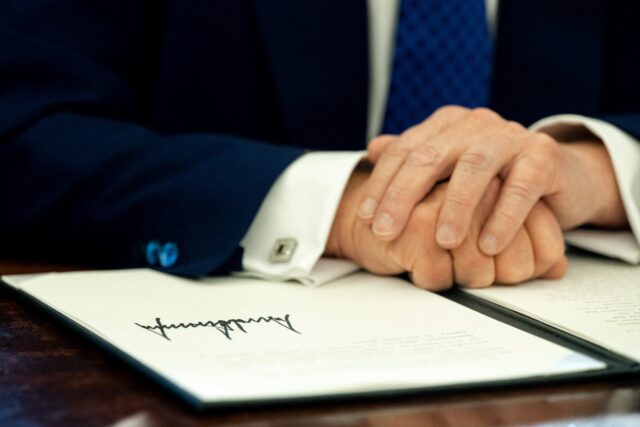President Trump yesterday issued an executive order declaring sweeping power over agencies that were created to operate independently from the White House. The order declares that "officials who wield vast executive power must be supervised and controlled by the people's elected President," and that "it shall be the policy of the executive branch to ensure Presidential supervision and control of the entire executive branch."
An accompanying fact sheet issued by the White House said the order applies to "so-called independent agencies like the Federal Trade Commission (FTC), Federal Communications Commission (FCC), and Securities and Exchange Commission (SEC)." The Federal Election Commission is also expected to be affected by the order.
The White House said it will require independent agencies to submit draft regulations for review, except for the monetary policy functions of the Federal Reserve. Independent agencies are also ordered to "consult with the White House on their priorities and strategic plans." The order claims more White House control over how agencies spend their budgets.
The White House Office of Management and Budget will "adjust such agencies' apportionments by activity, function, project, or object, as necessary and appropriate, to advance the President's policies and priorities," the executive order said. These budget changes "may prohibit independent regulatory agencies from expending appropriations on particular activities, functions, projects, or objects, so long as such restrictions are consistent with law."
The executive order is likely to be challenged in court. Separately, the Trump administration is asking the Supreme Court to reverse a judge's ruling that blocked Trump's attempt to fire the head of the Office of Special Counsel, an independent agency that protects government whistleblowers.
Order: Don’t contradict the president
Employees of independent agencies would also be forbidden from issuing legal interpretations that contradict the president's legal interpretations. "No employee of the executive branch acting in their official capacity may advance an interpretation of the law as the position of the United States that contravenes the President or the Attorney General's opinion on a matter of law, including but not limited to the issuance of regulations, guidance, and positions advanced in litigation, unless authorized to do so by the President or in writing by the Attorney General," the Trump order said.



 Loading comments...
Loading comments...
